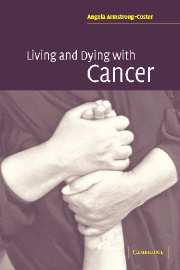Preface: Opening the silence
Published online by Cambridge University Press: 22 September 2009
Summary
Dying is a period of life, fraught with complex issues which can occasion a depth of feeling impossible to quantify. This, in part, may be why details about the actual minutiae of dying, a devastating experience, are not usually made public knowledge. The actuality of serving what is left of a life, of continuing to survive in what to many becomes an enforced and unspeakable existence, is not often aired before the public. The pain is quite simply too much to be transmitted (Frank, 1995). Consequently, there is a dearth of valid, truthful experiential accounts of dying which warrants immediate attention. My respondents allowed me a brief glimpse into that most awful of experiences.
To give these previously silent voices a space in which they may be heard, to open up this silence, I decided that this book would be narrative driven. I was aware of the value of the stories and the responsibility of presenting the information ethically. Having grasped something of their pain and appreciated the urgent need for these stories to be made public, my objective was to act as transmitter of what I heard. This book is primarily concerned with presenting and analysing the respondents' view, the stories which they told me. It makes no claim to be generalisable. It quite simply attempts to present a series of accounts from individuals of what it was like for them to be dying from cancer.
- Type
- Chapter
- Information
- Living and Dying with Cancer , pp. ix - xiPublisher: Cambridge University PressPrint publication year: 2004



